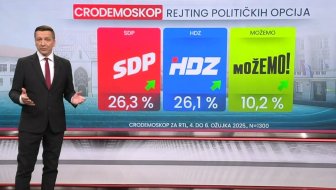At forthcoming local elections the Croatian People's Party - Liberal Democrats (HNS) plans to win 20 per cent more mandates than it now has, the HNS leader and First Deputy Prime Minister, Radimir Cacic, told a press conference on Saturday ahead of a meeting of the party's main committee.
Cacic said that the HNS currently had 73 county prefects, mayors, their deputies and municipal heads, and that it would be easy to check if they managed to improve their performance or not.
When asked to comment on the announced possibility of former Social Democratic Party (SDP) environment minister Mirela Holy running in Zagreb's mayoral election as the Labour Party candidate, Cacic said that it showed that the Labour Party did not have good enough candidates and did not want to take responsibility. "It makes no difference to the HNS whether Holy runs with Labour or not and actually we're not interested," he said.
"The HNS's political views have always been clear and we haven't lost our bearings," Cacic said, adding that the HNS would field "a candidate of top-class reputation and references who goes beyond the framework of party influence and can bring together everything that Zagreb has."
"If we opt for cooperation with the SDP, we will offer a quality candidate who can move things forward," Cacic said. He declined to discuss names, saying that their candidate did not need any additional political promotion.
When asked about the SDP's candidate for Mayor of Zagreb, Cacic said that Davor Bernardic was very talented and had great potential to become a very good mayor, adding that the HNS would help in that if it agreed so with the SDP.
Responding to the question about a possibility of an early election in Zagreb because of budget problems, Cacic said there was need for it.
Cacic said that the HNS main committee would analyse issues relating to cooperation with other parties at state level, with emphasis on the preparation of local organisations and defining the principles of cooperation with coalition partners.
The problem of the parties that are currently in power at state level is a discrepancy between their results in parliamentary and local elections. Never in more than two decades have the centre-left parties won a majority in local elections, and even when we did win a majority at state level we failed to translate it to the local level, Cacic said, noting the importance of forthcoming local elections for stabilising the functioning of the coalition government at state level.




































